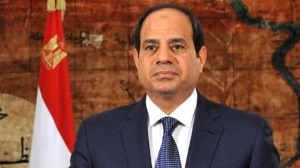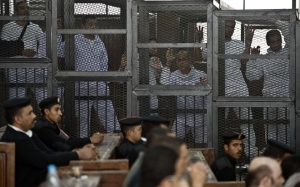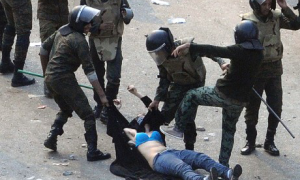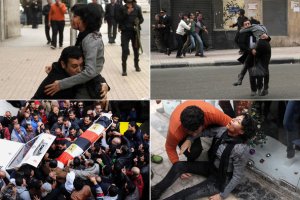Nadine Marroushi, 30, Anglo-Palestinian freelance journalist, lived and worked in Egypt between July, 2011 and February, 2015. She witnessed and told historical changes from Hosni Mubarak‘s deposition to Abdel Fattah al-Sisi‘s rise. A costly privilege. Nadine told us what it means to work as a journalist in a volatile and, more often than not, hostile environment.
Many had hoped that the Arab spring would have fostered a positive change across the entire Middle East. And yet, expectations have been betrayed. The mirage faded away all too soon and it was back to the ordinary routine of authoritarianism and repression (perhaps, with the sole exception of Tunisia).
Egypt dismissed Pharaoh Mubarak and lived a brief honeymoon with Mohamed Morsi‘s Muslim Brotherhood, who was in turn discharged by the general he himself had appointed as head of the armed forces: al-Sisi. Those who had hoped for an opening of the public space to political debate, those who had wished for the end of decennial oppressive regimes, those who believed that women, who had bravely and passionately participated in the January 25 Revolution, would have lived a new era of freedom and participation, all of them were bitterly disappointed.
The so called al-Jazeera trial, involving Peter Greste (Australian), Mohamed Fahmy (Egyptian-Canadian) and Baher Mohamed (Egyptian, the only one still in jail), has made dramatically clear that freedom of press is still utopia. Mob sexual assaults testify of the insecure and misogynistic climate that Egyptian women face in the streets and squares. Shaimaa al-Sabbagh‘s death denounces the violence used by the Government against dissent.
You spent more than three years in Egypt working as a journalist. Now, being a journalist in Egypt is remarkably inconvenient and troublesome, how is it to be a female journalist?
Being a female journalist in Egypt means that you have to contend with the added stress of daily incidents of sexual harassment. According to a UN study, published in 2013, 99.3% of Egyptian women have faced some form of sexual harassment on a daily basis with touching a woman’s body being the most common form. It’s something I experienced too – from the daily comments of “mozza”, which means “hot chic”, to the much more inappropriate groping of my buttocks while reporting from crowded protests and being followed by cars of lone men when walking on the side of the street. It just makes daily life that more stressful and means that as a woman you always have your guard up.
In July, last year, you were arrested along with some colleagues. Can you tell us more about this unpleasant experience?
I went to cover one aspect of the war between Gaza and Israel, which was the closure of the Rafah crossing and the treatment of the few Palestinians who were injured and let across the border to be treated in the hospital in Arish.
After a full day of reporting, me and two freelance French journalists were arrested in the apartment we were renting. Tall and bulky plain-clothed men, some armed with AK-47s, came to arrest us after midnight from the apartment. They took us to the local security directorate where we were told we could not stay in North Sinai because the local authorities could not guarantee our safety. So we were deported back to Cairo.
Journalists are normally required to receive special permits from National Security to cover what’s happening in North Sinai. But they are very slow to obtain and with a war going on, time is of the essence.
You wrote a brave and frank piece on PTSD for The Telegraph. Can you tell us how your work in a distressing environment affected your mental health?
You don’t really take the time to think about how what is happening around you is affecting you personally when you’re a journalist covering the lives of people who are the victims of what is happening. I certainly did not. I always felt privileged to be witnessing and taking part in the historical changes happening in Egypt. But, after two and a half years of doing so and witnessing a massacre (Rabaa al-Adaweya) as well as seeing how millions of people justified and supported the massacre, mentally I could no longer take it. I felt very sad for humanity, and for the revolution that had given so many people, including myself, hope for positive change in our region.
So, the nightmares, panic attacks and depression began when I came back to London in the autumn of 2013. It took about 6 to 7 months before I felt better again after going on anti-depressant medication and seeing a good therapist.
You covered the so-called al-Jazeera trial and the protest outside the Egyptian Embassy in London, last January. What are your feelings about press freedom in Egypt and elsewhere?
I covered the al-Jazeera trial but I didn’t participate in the protest outside the Egyptian embassy. I covered that too for an article I wrote for the London Review of Books.
On the whole, press freedom is at a low point in Egypt. There are at least 16 journalists in jail in Egypt, according to Reporters Without Borders, making it the fourth largest jailer of journalists in the world.
Late last year, a number of the editors of daily national newspapers in Egypt signed an agreement to support to government in its “war on terror” and cease to be critical of it. The good thing is that hundreds of local journalists protested against this.
And as a journalist, I would no longer feel comfortable conducting interviews on the streets in Egypt or in public spaces. I’d be very wary of that. I was attacked by a mob of people on 25 January 2014 when I was covering events in Tahrir Square. Late last year, a journalist and her sister were detained from a café after they were speaking critically of the government to Alain Gresch of Le Monde Diplomatique.
The space to speak freely and critically in Egypt has shrunk significantly.
Journalists are not the sole targets of al-Sisi regime. The ‘war on terror’ special measures justify not only the cracking down of the Muslim Brotherhood but also the persecution of secular political and human rights activists. Can you tell us more about the controversial Protest Law?
The controversial Protest Law effectively bans all but police-authorised demonstrations. And while the government maintains that all requests have been approved, many activists see that the law reverses hard won gains after the 25 January revolution, or uprising, by bringing back the police state.
Amnesty International, who I work for now, has also raised concerns that the law gives security forces free reign to use lethal force against demonstrators.
Since the law has been issued, we have seen hundreds of peaceful demonstrators arrested for illegal assembly, and killed – as in the case of Shaimaa al-Sabbagh.
Here is Amnesty’s comment on the law.
Another disturbing aspect of the political and social climate is mob sexual harassment. What’s the social attitude toward women in the public space? I think of Hend Nafea and of the women assaulted in Tahrir sq during the celebrations for al-Sisi’s election.
Well, it’s much worse than harassment – it would be more accurate to describe some of these incidents as mob sexual assault and rape.
According to Cairo-based NGO Nazra for Feminist Studies, there have been more than 500 documented incidents of sexual violence crimes between June 2012 and January 2014. During the one week of political violence during the events before after 30 June 2013, there were 186 incidents of sexual violence in Tahrir Square, according to Dalia Abdel Hameed, gender rights researcher at the human rights group Egyptian Initiative for Personal Rights.
I have been an anti-sexual harassment volunteer in Tahrir Square and seen the mob attacks for myself. In one incident, a woman was raped in Tahrir Square with a knife. But according to the law, this is not considered rape, only indecent assault. There is a need for reforms in the rape law.
So, the reality is that women have not been made to feel that they have a safe space for themselves in public. Rather, that space has been made very violent towards them so that women feel that their rightful place is in fact at home.
The hopeful thing is that many women continue to push against this and fight these patriarchal and anti-revolutionary attitudes. I think here of women like Hend Nafea and Samira Ibrahim, who bravely spoke out against virginity testing.
Even among the female Sisi supporters, women play very strong and leading roles within the family.
It’s the public space for women who hold opposing and critical views that we have seen shrinking and that has come hand in hand with the general atmosphere of repression.
Al-Sisi put an effort to publicise the trial of the men indicted for Tahrir sq sexual assaults. Is that plain propaganda? Or, on the contrary, does it reflect a genuine concern of the government?
Al-Sisi did announce that there should be a national strategy to combat sexual harassment after the June 2014 incidents took place. That was unprecedented but the problem with that is that the incidents were much more serious than that. It involved women being stripped naked in a public square, robbed, beaten and left bloodied and bruised. This is serious sexual assault. When the leader of the country is underplaying the incident through the use of downgraded terminology this is problematic.
We have seen little serious action to combat violence against women since the trial, or a readiness to open investigations into other serious incidents of assault and rape, which makes the trial of the men post-June 2014 look tokenistic.
The government needs to act much more swiftly in taking all incidents of violence against women, including domestic violence, seriously. To date, there is no law that criminalises domestic violence in Egypt. And for that, Egypt needs a parliament.
Special thanks for this peace go to Nadine Marroushi, whom I studied with at SOAS few years ago. A strong and brave woman and a great professional.
The original version of this article was published in Italian on L’Indro 26/03/2015




Amnesty says Egypt using courts and jail to intimidate journalists
http://uk.reuters.com/article/2015/05/03/uk-egypt-journalists-idUKKBN0NO0N120150503
LikeLike